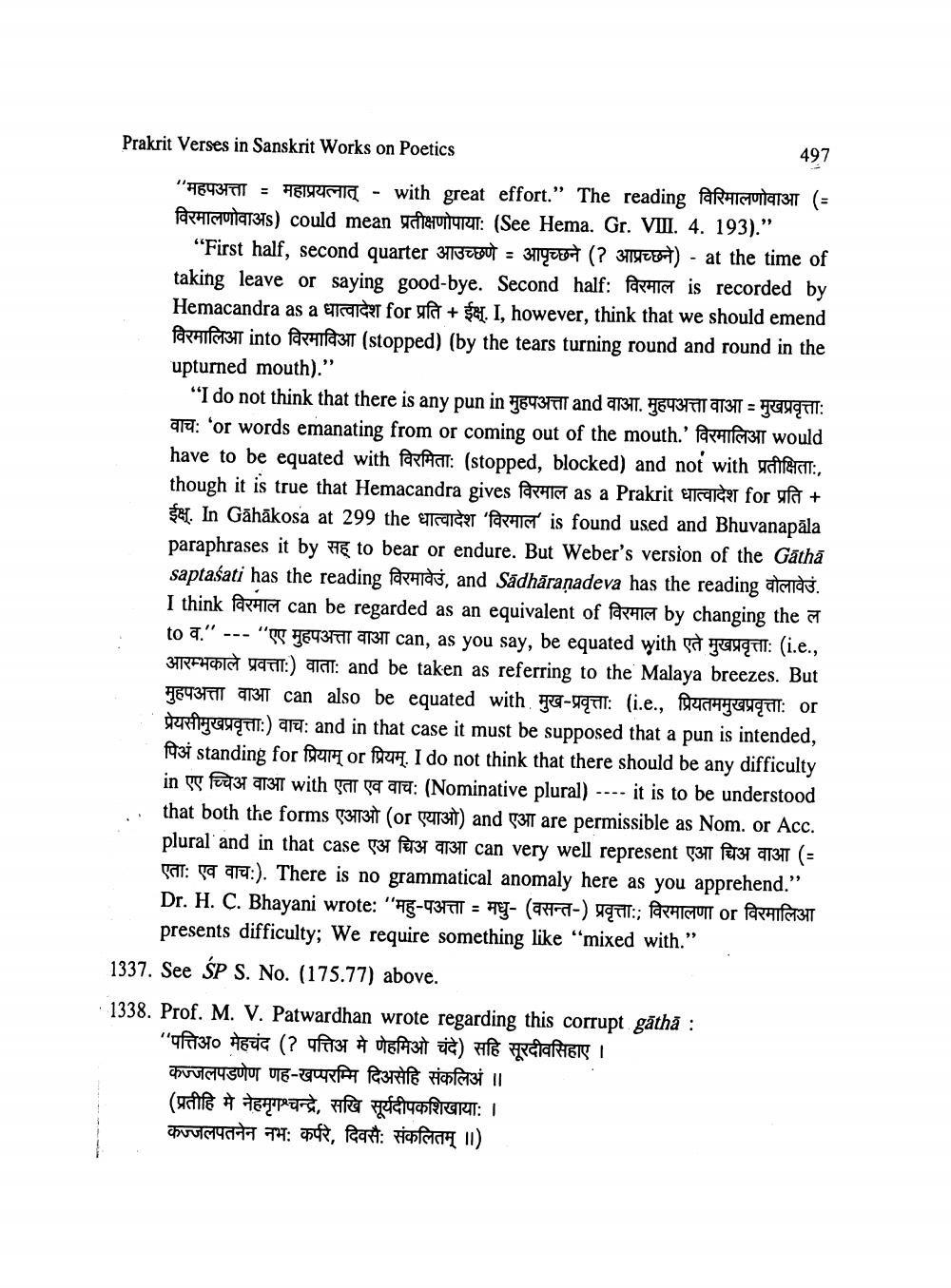________________
Prakrit Verses in Sanskrit Works on Poetics
497
"महपअत्ता = महाप्रयत्नात् - with great effort." The reading विरिमालणोवाआ (= विरमालणोवाअs) could mean प्रतीक्षणोपाया: (See Hema. Gr. VIII. 4. 193)."
"First half, second quarter आउच्छणे - आपृच्छने (? आप्रच्छने) - at the time of taking leave or saying good-bye. Second half: f ic is recorded by Hemacandra as a धात्वादेश for प्रति + ईक्ष. I, however, think that we should emend विरमालिआ into विरमाविआ (stopped) (by the tears turning round and round in the upturned mouth).” __ "I do not think that there is any pun in मुहपअत्ता and वाआ. मुहपअत्ता वाआ = मुखप्रवृत्ता: वाच: 'or words emanating from or coming out of the mouth.' विरमालिआ would have to be equated with विरमिता: (stopped, blocked) and not with प्रतीक्षिता:, though it is true that Hemacandra gives विरमाल as a Prakrit धात्वादेश for प्रति + ईक्ष. In Gahakosa at 299 the धात्वादेश 'विरमाल' is found used and Bhuvanapala paraphrases it by FE to bear or endure. But Weber's version of the Gathā saptasati has the reading विरमावेउं, and Sadhāranadeva has the reading वोलावेउं. I think विरमाल can be regarded as an equivalent of विरमाल by changing the ल to व." --- "एए मुहपअत्ता वाआ can, as you say, be equated with एते मुखप्रवृत्ता: (i.e.,
आरम्भकाले प्रवत्ता:) वाता: and be taken as referring to the Malaya breezes. But मुहपअत्ता वाआ can also be equated with मुख-प्रवृत्ता: (i.e., प्रियतममुखप्रवृत्ता: or प्रेयसीमुखप्रवृत्ता:) वाच: and in that case it must be supposed that a pun is intended, पिअंstanding for प्रियाम् or प्रियम्. I do not think that there should be any difficulty in एए च्चिअ वाआ with एता एव वाच: (Nominative plural) ---- it is to be understood that both the forms एआओ (or एयाओ) and एआ are permissible as Nom. or Acc. plural and in that case एअ चिअ वाआ can very well represent एआ चिअ वाआ (= एता: एव वाच:). There is no grammatical anomaly here as you apprehend." Dr. H. C. Bhayani wrote: "महु-पअत्ता = मधु- (वसन्त-) प्रवृत्ताः; विरमालणा or विरमालिआ
presents difficulty; We require something like "mixed with." 1337. See P S. No. (175.77) above. • 1338. Prof. M. V. Patwardhan wrote regarding this corrupt gatha :
"पत्तिअ० मेहचंद (? पत्तिअ मे णेहमिओ चंदे) सहि सूरदीवसिहाए । कज्जलपडणेण णह-खप्परम्मि दिअसेहि संकलिअं ॥ (प्रतीहि मे नेहमृगश्चन्द्रे, सखि सूर्यदीपकशिखायाः । कज्जलपतनेन नभ: कपरे, दिवस: संकलितम् ।)




